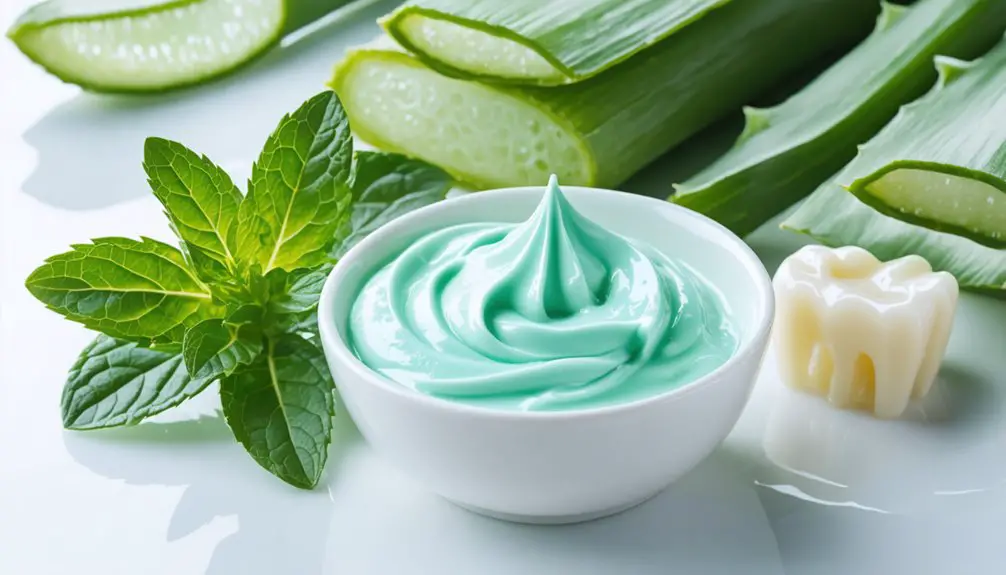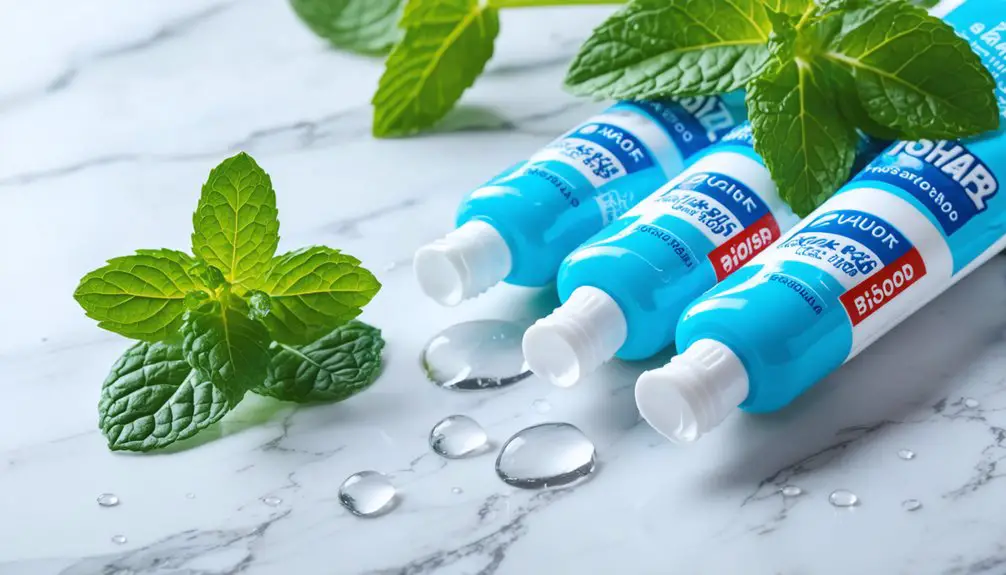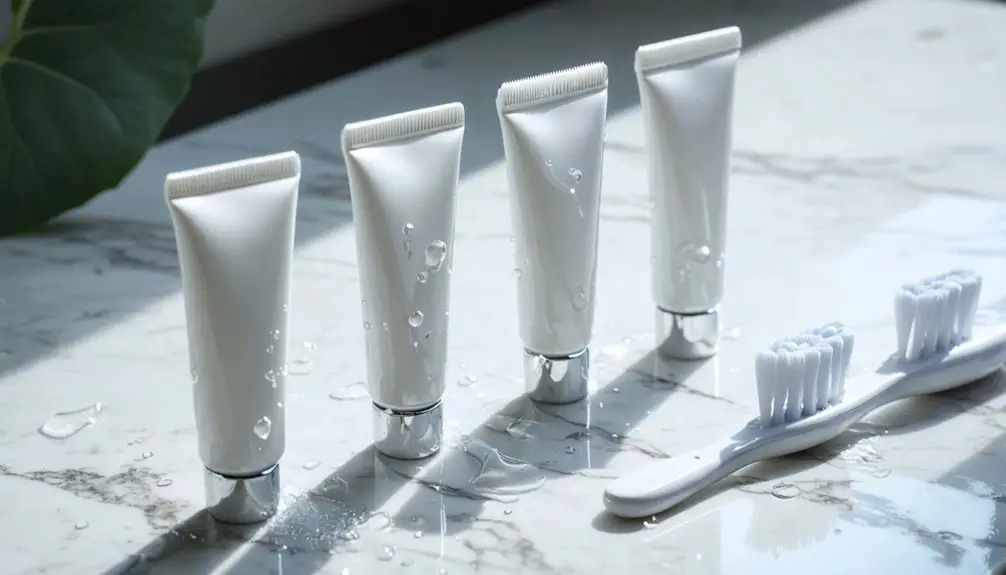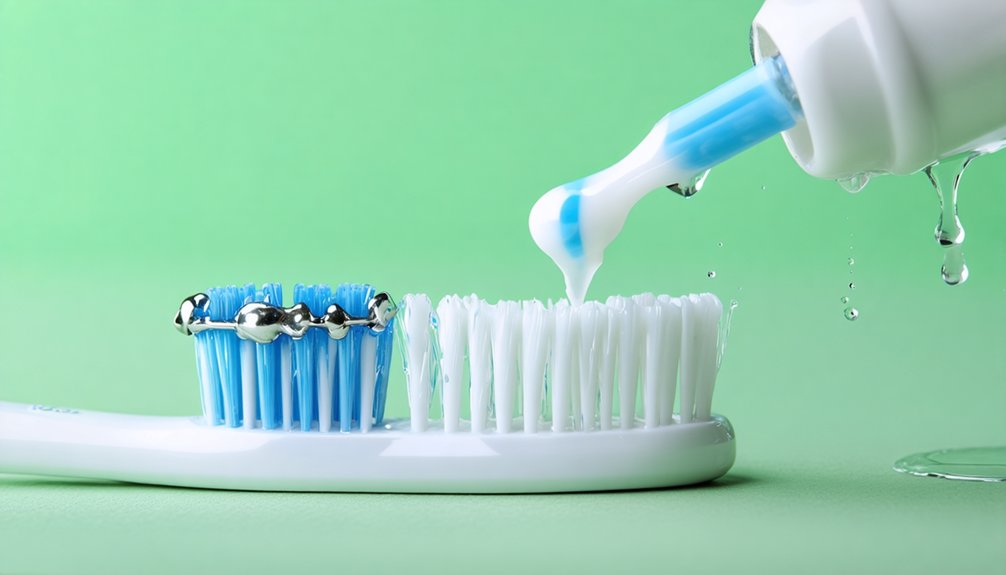You’ll discover that chemical-free toothpaste offers a safer path to a brighter smile through natural ingredients like bromelain enzymes and gentle abrasives. These formulations effectively remove surface stains while protecting your enamel integrity, unlike harsh chemical alternatives. Plant-based compounds and essential oils provide antimicrobial benefits, while ingredients like hydroxyapatite help fill enamel defects for enhanced whiteness. Understanding the science behind natural oral care reveals even more powerful benefits for your dental health.
Key Takeaways
- Natural enzymes like bromelain and papain effectively whiten teeth while maintaining enamel integrity and causing minimal sensitivity.
- Baking soda provides gentle abrasive action and acid neutralization for safe, natural whitening without harsh chemicals.
- Hydroxyapatite fills enamel defects to enhance tooth brightness and prevent future staining while strengthening teeth.
- Plant-based ingredients like turmeric offer antioxidant protection while naturally brightening teeth through gentle stain removal.
- Natural whitening toothpaste containing activated charcoal safely lifts surface stains while preserving enamel structure.
Understanding Natural Ingredients in Modern Oral Care
The evolution of natural ingredients in modern oral care represents a significant shift from conventional chemical-based formulations.
You’ll find powerful natural antimicrobial properties in essential oils like sage and lemongrass, which effectively disrupt bacterial cell walls and prevent tooth decay.
Plant-based antioxidants from sources like turmeric not only combat harmful bacteria but also protect your gums from oxidative stress.
These ingredients work synergistically with natural minerals to support enamel remineralization while maintaining ideal oral pH balance.
Natural and organic formulations are experiencing rapid adoption, with a projected 6.94% CAGR through 2030.
You’re getting extensive protection through compounds like tannins, phenolics, and flavonoids that inhibit bacterial growth and biofilm formation.
The growing clean beauty movement has significantly influenced consumers to seek safer, chemical-free alternatives in their oral care routines.
The Science Behind Chemical-Free Whitening
Your teeth’s natural whiteness can be restored through enzyme-based agents like bromelain and papain, which break down protein-based stains without harsh oxidizing chemicals.
You’ll find these natural whitening methods work alongside hydroxyapatite, which fills microscopic enamel defects to enhance tooth brightness and reduce future staining.
Clinical studies show these chemical-free whitening approaches match the effectiveness of peroxide-based products while better preserving your tooth enamel’s integrity and reducing sensitivity risks.
Research confirms that enzyme-based whitening gels maintain near 100% cell viability compared to traditional peroxide treatments.
The gentle abrasive action of natural ingredients helps remove surface stains while maintaining a balanced pH level needed for optimal oral health.
Natural Whitening Agents Explained
Understanding natural whitening agents requires examining their mechanisms of action and clinical effectiveness in tooth brightening.
Recent studies suggest that OTC whitening products have seen significant market growth as consumers seek natural alternatives.
When you’re seeking chemical-free options, it’s essential to understand both baking soda benefits and hydrogen peroxide risks before making informed choices for your dental care routine.
Regular dental check-ups and cleanings are crucial for maintaining the effectiveness of natural whitening methods and ensuring overall oral health.
- Baking soda works as a mild abrasive to remove surface stains while neutralizing harmful acids, making it a safe and effective natural whitening agent.
- Hydrogen peroxide penetrates enamel to oxidize deep stains, but higher concentrations may compromise tooth integrity.
- Activated charcoal can remove extrinsic stains mechanically, though its effectiveness is modest compared to peroxide-based methods.
- Fruit-based agents offer gentle whitening through mild acids and enzymes, but they’re limited to superficial stain removal.
Safe Stain Removal Methods
While traditional whitening methods often rely on harsh chemicals, innovative chemical-free approaches now offer safe and effective alternatives for stain removal.
You’ll find gentle abrasives like activated charcoal and baking soda that mechanically lift surface stains without damaging your enamel. These natural options work through physical stain removal rather than chemical bleaching. Regular whitening maintenance with these methods can provide stable results that last.
Advanced technologies like nanoparticle hydrogel treatments provide even more sophisticated solutions. When activated by green light, these specialized gels can both whiten teeth and reduce harmful bacteria by up to 94%. The hydrogel treatment is especially effective on teeth stained with coffee and tea.
They’re particularly effective because they don’t require brushing, which eliminates risks associated with mechanical abrasion. For ideal results, look for products that incorporate fluoride or minerals to strengthen your enamel during the whitening process.
Mineral-Based Teeth Brightening
Modern mineral-based teeth brightening represents a significant advancement in chemical-free whitening technology, particularly through its innovative use of piezo-catalysis and protective mineral films.
You’ll find this approach focuses on enamel preservation while achieving effective stain removal through mineral enhancement techniques. The pH levels of these treatments help maintain optimal enamel integrity during the process.
- Barium titanate nanoparticles generate stain-breaking oxygen species through ultrasonic vibration, avoiding harsh chemical oxidation.
- Protective mineral films shield your teeth from demineralization while supporting natural whitening processes.
- Remineralizing agents actively restore calcium and phosphorus levels post-treatment.
- Mechanical activation breaks down stains during routine brushing without compromising enamel integrity.
This scientifically-proven method maintains your tooth structure’s mineral balance while delivering professional-grade whitening results. The three-hour vibration treatment has been proven effective at removing stubborn stains from substances like black tea, wine, and blueberry juice.
Unlike traditional peroxide treatments, you won’t experience the significant mineral fluctuations that can weaken enamel over time.
Key Benefits of Switching to Natural Toothpaste
You’ll discover that chemical-free toothpaste offers a gentle yet effective daily cleaning routine without the risks of synthetic additives or harsh abrasives.
Natural toothpaste formulations utilize plant-based enzymes and proteins that support your oral microbiome while still maintaining excellent plaque control.
The natural whitening compounds found in these toothpastes, such as theobromine, work to strengthen and polish your enamel while avoiding the sensitivity issues sometimes associated with chemical whitening agents.
Safe For Daily Use
Switching to natural, chemical-free toothpaste offers several compelling health benefits for daily oral care.
You’ll find these products are formulated with natural flavors and often come in eco-friendly packaging, making them a responsible choice for both personal and environmental health.
- Safe for all age groups, from young children to elderly individuals, reducing risks associated with swallowing conventional toothpaste
- Gentle on sensitive teeth and gums while maintaining effective cleaning power through plant-based ingredients
- Free from artificial preservatives, colors, and harsh detergents that can cause irritation
- Contains soothing natural ingredients like aloe vera and herbal extracts that promote gum health
When used consistently, chemical-free toothpaste provides thorough cleaning while minimizing exposure to synthetic compounds, making it an excellent choice for your daily oral hygiene routine.
Natural Whitening Power
Natural toothpaste formulations harness the power of gentle abrasives and optical colorants to whiten teeth without harsh chemicals.
You’ll find effective natural whitening ingredients like baking soda, activated charcoal, and sodium carbonate that physically remove surface stains while preserving your enamel integrity.
Unlike chemical bleaching agents, these gentle abrasives work gradually, showing improved results over weeks of consistent use. They’re particularly effective at reducing supragingival debris and yellow stains through careful cleansing action.
The natural ingredients often contain antioxidants and anti-inflammatory properties that support overall oral health while brightening your smile.
While the whitening process may take longer than peroxide-based alternatives, you’ll avoid the sensitivity and gingival irritation commonly associated with chemical whiteners, making natural toothpaste a safer choice for daily use.
Effective Alternatives to Traditional Fluoride
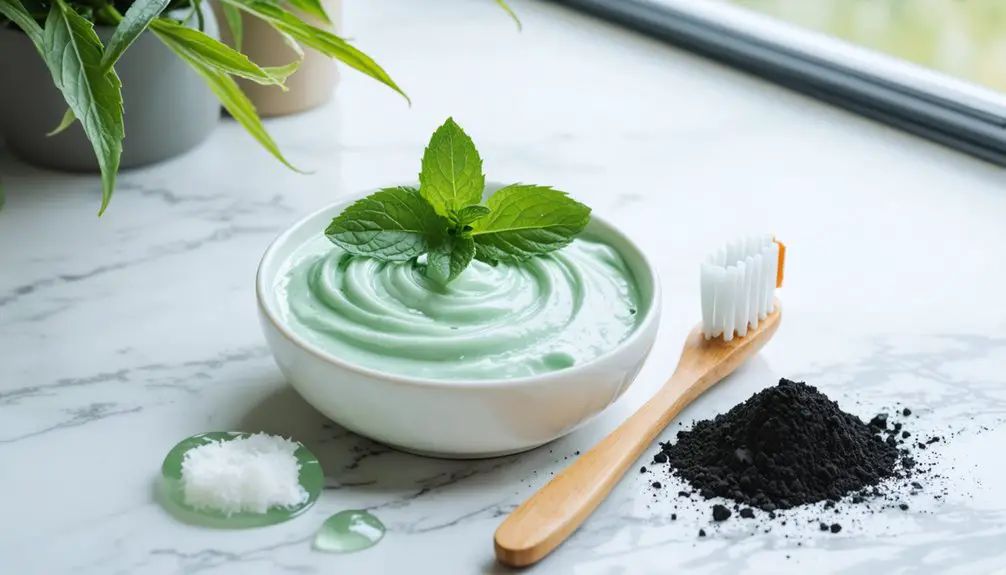
While fluoride has long been the standard in dental care, several effective alternatives have emerged that offer comparable benefits for oral health.
Modern dental science has uncovered natural alternatives that match fluoride’s protective power, giving health-conscious consumers more choices for oral care.
When choosing non-toxic ingredients for holistic oral care, you’ll find scientifically-backed options that support your dental wellness naturally.
- Calcium hydroxyapatite, a biocompatible mineral, effectively remineralizes tooth enamel and prevents cavities.
- Xylitol, derived from fruits and vegetables, inhibits bacterial growth while supporting enamel strength.
- Nano-hydroxyapatite provides enhanced remineralization effects comparable to traditional fluoride.
- Theobromine and arginine work together to maintain pH balance and prevent tooth decay.
These alternatives offer proven cavity prevention while working harmoniously with your body’s natural processes.
You’ll find these ingredients in various formulations, allowing you to choose the option that best suits your specific oral health needs.
Choosing the Right Natural Toothpaste Formula
Building on our understanding of fluoride alternatives, selecting an effective natural toothpaste formula requires careful consideration of multiple factors.
You’ll want to examine ingredient transparency, guaranteeing the product contains plant-based components like organic coconut oil and botanical extracts while avoiding synthetic chemicals such as SLS and parabens.
Look for natural antimicrobial agents like peppermint and tea tree oils, along with gentle abrasives such as hydrated silica or calcium carbonate.
When evaluating toothpaste flavors, consider options ranging from traditional peppermint to unique varieties like ginger or charcoal.
Don’t overlook packaging sustainability – opt for brands using BPA-free, recyclable materials that align with eco-conscious values.
Check for certifications like B Corp and cruelty-free to guarantee your choice supports ethical production standards while delivering effective oral care.
Essential Components for Optimal Dental Health
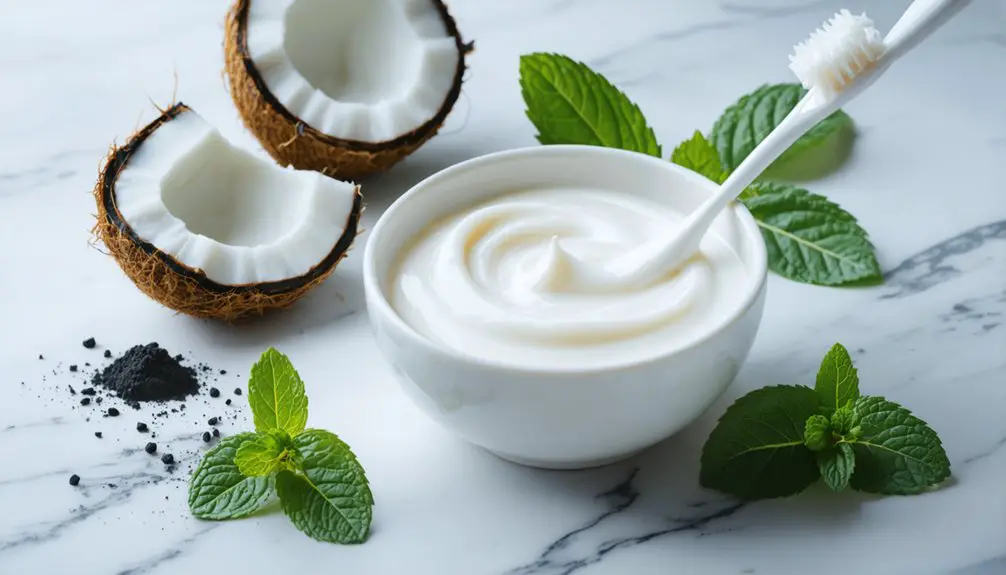
Maintaining ideal dental health requires a thorough approach that integrates multiple essential components. Your dental hygiene routine should incorporate proven techniques and products that promote optimal oral wellness.
When selecting components for your daily regimen, focus on items that deliver extensive care while supporting natural oral health.
- Use a soft-bristled toothbrush and natural fluoride-free toothpaste for gentle yet effective cleaning of all tooth surfaces.
- Incorporate interdental cleaning tools like floss or water picks to remove debris between teeth and below the gumline.
- Choose tongue scrapers to reduce bacterial buildup and maintain fresh breath.
- Support your oral health with nutrient-rich foods high in calcium, phosphorus, and essential vitamins while avoiding acidic and sugary items.
Frequently Asked Questions
How Long Does It Take to See Whitening Results With Natural Toothpaste?
You’ll notice a tremendously exciting whitening timeline within 2-4 weeks of using natural ingredients, with more dramatic results appearing after 6-8 weeks of consistent brushing with your natural toothpaste.
Can Chemical-Free Toothpaste Effectively Remove Coffee and Wine Stains?
You’ll get partial stain removal from coffee and wine with chemical-free toothpaste, but ingredient effectiveness is limited. Natural abrasives only remove surface stains, not deeper discoloration from these beverages.
Is Natural Toothpaste Safe for Children Under Age Five?
Your child’s sensitive gums deserve gentle care. Natural toothpaste can be safe if it meets pediatric recommendations, but you’ll need to verify fluoride content and avoid essential oils that might trigger allergies.
Do Natural Toothpastes Have a Shorter Shelf Life Than Conventional Ones?
You’ll find both types typically last 24 months, though natural toothpaste’s shelf stability may vary. Natural preservatives can maintain freshness effectively, but you should check specific product recommendations after opening.
Will Switching to Chemical-Free Toothpaste Cause Temporary Tooth Sensitivity?
Like waves on a beach, your tooth sensitivity may ebb and flow initially when switching to natural ingredients. You’ll typically experience temporary changes for 2-4 weeks as teeth adapt.
References
- https://smilesonic.com/are-natural-toothpastes-healthy-what-you-should-know-before-switching/
- https://azdentalclub.com/the-truth-about-fluoride-free-toothpaste-benefits-and-risks/
- https://orlcares.com/blogs/orl-cares-blog/the-benefits-of-using-a-fluoride-free-toothpaste
- https://www.healthline.com/health/dental-and-oral-health/natural-organic-toothpastes
- https://emergencydentalofomaha.com/5-benefits-to-plant-based-toothpastes/
- https://www.marketresearch.com/Global-Industry-Analysts-v1039/Natural-Organic-Oral-Care-Products-41292987/
- https://www.mordorintelligence.com/industry-reports/oral-care-market
- https://pmc.ncbi.nlm.nih.gov/articles/PMC10218970/
- https://pmc.ncbi.nlm.nih.gov/articles/PMC8614929/
- https://www.nature.com/articles/d42473-021-00517-5
